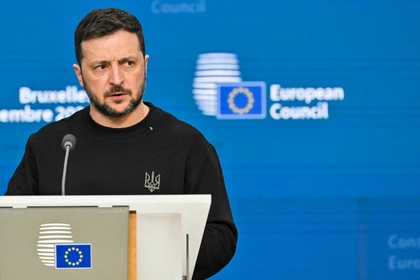European Commission President Ursula von der Leyen said on Friday that she proposed to former US President Donald Trump that the US could increase its supply of liquefied natural gas (LNG) to the EU, potentially replacing energy imports from Russia.
With Trump poised to return to the White House after a campaign focused on threats of steep tariffs on foreign goods, the EU is keen to avoid a trade war with its top ally, AFP reported.
JOIN US ON TELEGRAM
Follow our coverage of the war on the @Kyivpost_official.
Von der Leyen said that it’s important to engage with Trump over “common interests,” mentioning a phone call with him on Thursday.
“Common interests are, for example – this is one topic that we touched upon, I would not say discuss – it’s the whole topic of LNG,” von der Leyen told reporters in Budapest, where EU leaders were concluding two days of talks.
Europe still receives “a lot of LNG via Russia,” von der Leyen explained, adding, “Why not replace it by American LNG, which is cheaper for us and brings down our energy prices?”
The European Commission president also said that the topic of LNG could be tied to the EU’s trade deficit with the United States.
During his campaign, Trump vowed to implement at least a 10 percent tariff on all imports, among other protectionist measures. He argued this would target countries he accused of “ripping us off for years” and help reduce the US trade deficit.

Orban Plans to Block EU Sanctions on Russia Ahead of Trump Inauguration
Since Russia’s 2022 full-scale invasion of Ukraine, the European Union has significantly increased its purchase of American LNG, though it has not fully severed its energy ties with Moscow.
German Chancellor Olaf Scholz also expressed optimism about finding areas of compromise with a Trump administration.
“Ultimately, the growth and strength of the United States also depend on the fact that it trades with the whole world, and in both directions,” Scholz said at a press conference following the leaders’ talks in Budapest, adding that there were “foundations” for developing a common policy.
You can also highlight the text and press Ctrl + Enter






